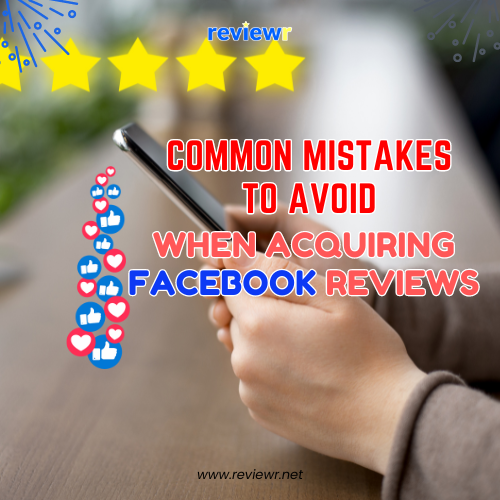Nowadays, social proof plays an integral role in building an online reputation. Customers now have easy access to various social media platforms, so they can easily verify if a business is providing an excellent service or not. In Facebook, for instance, reviews are a significant tool to showcase a business’ authenticity and reputation. Positive reviews boost consumer trust and acquisition, while bad ones might ruin a brand's reputation. Given the importance of online reviews, business owners must learn how to avoid some common mistakes when acquiring quality Facebook reviews from their customers. Be it for their products or services, this can make a huge difference!
Common Mistakes to Avoid When Acquiring Facebook Reviews
Failing to Provide a Positive Customer Experience
A common error businesses make when dealing with Facebook reviews is overlooking the basis of these recommendations: the customer experience. No solicitation or incentives can compensate for poor service or product quality. To get authentic, positive feedback, provide excellent experiences at every customer journey stage. Strive to surpass expectations and create a lasting impression with every consumer interaction with your company, including post-purchase assistance.
Failing to Ask for Reviews
Another common mistake is failing to get customer feedback, whether they are satisfied or not with what you have provided. Many business owners think customers would post reviews even without asking them, however, a slight nudge is often required. How you ask for reviews indeed matters. Avoid making basic, impersonal inquiries and instead personalize your approach. Make it a bit personal and convenient. Timing is also important; ask for feedback when consumers are most likely to have good feelings, such as after a successful purchase or after they have used the product, or experienced the service.

Offering Inappropriate Incentives
While paying consumers to submit reviews might be appealing, it's vital to tread cautiously to avoid violating Facebook's policies. Offering monetary benefits, discounts, or freebies in exchange for reviews is against the platform's policies and may result in fines. Instead, focus on non-monetary incentives, such as exclusive access to information or entry into a raffle, to encourage feedback while maintaining integrity.
Ignoring Negative Reviews
Ignoring or removing unfavorable reviews is guaranteed to destroy trust and credibility. Every bad review, no matter how disappointing it can be, is an opportunity to grow and improve your business. Responding to timely, sensitive, and constructive criticism indicates accountability and a desire to satisfy customers. Negative feedback may help you improve your products, services, or procedures while demonstrating your attentiveness to potential clients.
Failing to Monitor and Manage Reviews Proactively
In the world of social media, reviews can be posted quickly, so monitoring them regularly is key for better engagement. Whether favorable or bad, failure to respond to reviews can make consumers feel unheard and such can aggravate problems. Implement a thorough review management system that allows you to track comments in real-time, reply quickly, and escalate concerns as required. Proactively, you can reduce possible damage and seize opportunities to interact with your audience.

Overlooking the Importance of Review Diversity
While positive feedback is unquestionably beneficial, a steady stream of praise might generate suspicions of manipulation. Aim for variety in your review profile by obtaining comments from consumers of diverse demographics and experiences. A combination of good, neutral, and even negative evaluations demonstrates authenticity, resulting in a more balanced and believable picture of your organization.
Soliciting Reviews Too Aggressively
While it is important to encourage consumers to post reviews, overwhelming them with requests might backfire. Excessive solicitation might upset clients, resulting in bad attitudes toward your business. Don't be pushy or sound to be forcing them. Instead, find a balance by effortlessly integrating review requests into your customer encounters and messages while respecting their time and preferences.
Failing to Provide Clear Instructions

Customers may only be able to post reviews if they need to learn how or if the procedure appears simple. Failure to give transparent, user-friendly instructions may discourage potential reviewers and result in missed opportunities. Streamline the review-getting process by providing step-by-step directions on submitting feedback via direct links, visual lessons, or basic instructions on your website or social media platforms.
Disregarding Local and Industry Regulations
Organizations may unintentionally miss fundamental or industry-specific restrictions governing the collection of reviews. Different types of businesses may have their criteria for testimonials, endorsements, and incentives. Failure to comply with these requirements might cause legal problems for your company and harm its reputation. Conduct extensive research or obtain legal assistance to ensure compliance with applicable laws and regulations.
Need More Quality Facebook Reviews?
Neglecting the Follow-Up Process
Securing a review should not be the end of your involvement with the customers; instead, it should indicate the start of a long-term relationship. Failure to follow up with them after they have written a review loses an opportunity to express thanks, obtain more input, or resolve any outstanding problems. Implement a post-review follow-up approach that recognizes consumers for their input, urges them to connect more with your business, and develops long-term loyalty.
Underestimating the Importance of Timing
Timing is vital for the efficacy of the review collection process. Requesting feedback or reviews at inconvenient times, such as immediately following an unpleasant encounter or during busy periods, can result in subpar outcomes. Conversely, properly scheduling your requests when clients are most likely in a good mood will dramatically enhance your chances of obtaining positive feedback. Consider customer satisfaction milestones, transaction completion, and post-purchase joy when planning your review requests.

Disregard to Leverage User-Generated Content
User-generated material, such as images, videos, and testimonials, may add value to your online visibility and credibility. Refraining from utilizing user-generated material as part of your review acquisition plan means disregarding a fantastic opportunity to represent your company through the eyes of delighted consumers. Encourage consumers to share their experiences visually and audibly on social media channels, including user-generated content in your marketing strategies.
Final Thoughts
Acquiring Facebook reviews is about more than just collecting insights from your customers. It's also about building trust, trustworthiness, and authenticity. By avoiding thesome common mistakes when getting quality reviews, you can leverage the power of Facebook as a tool to building your online reputation. Prioritize providing outstanding client experiences, solicit feedback efficiently, give appropriate incentives, accept bad criticism, handle reviews proactively, and strive for diversity. With a strategic strategy, Facebook reviews may become a cornerstone of your online reputation and a driver of business growth.









